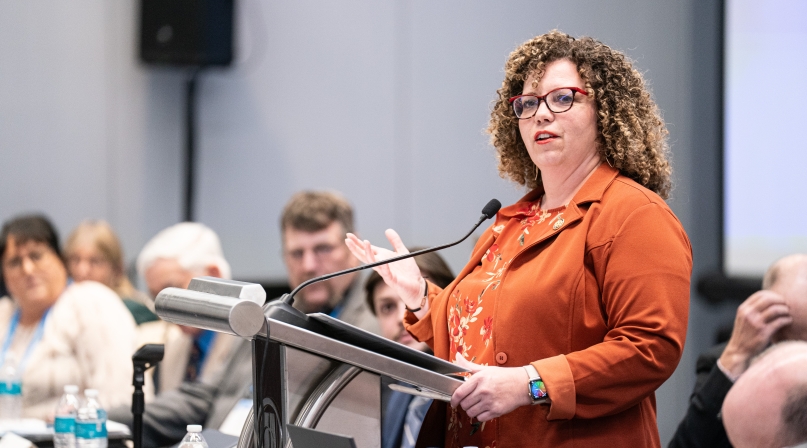History fuels optimism for county veteran Maloy

Key Takeaways
Amid rampant uncertainty early in the executive-branch-driven federal government reformation effort, Rep. Celeste Maloy (R-Utah) is hopeful.
“I am still really optimistic, and I know I’m in the minority,” she said. “Everything just changed and everybody’s feeling it.”
Maloy, who spent her career working for Washington County, Utah and the Utah Association of Counties before serving as congressional staff for her predecessor, spoke March 1 to the NACo Public Lands Steering Committee.
Her constituents are concerned about the continuity of services following reductions in the federal workforce, with more potentially on the way.
Among the concerns she heard in a local meeting in her southern Utah congressional district: “Are we still gonna get wildfire funds? Are we still gonna have the people we need? Are the agencies going to be able to do the things they are required to do?”
After describing a creeping sense of pessimism across the United States from people she described as “a lot older and wealthier,” Maloy countered that she saw parallels in the early steps taken by President Franklin D. Roosevelt.
“He became the president after two people that everyone considered really, really smart on economics, in the middle of the Great Depression,” she said. “Roosevelt came in and he decided that desperate times call for desperate measures. He started doing his big things and it scared everybody.
“The courts stopped some of it. Congress changed some of it, and that’s what gave us the administrative statement we have today. That’s why we have all the agencies we have. I think we’re seeing the mirror image of that right now.”
When Roosevelt took office in 1933, unemployment peaked at 25%, whereas the unemployment rate in early 2025 hit roughly 4%.
Maloy’s concern comes from the $36 trillion U.S. national debt.
“We have this administrative state… doing the same things we’ve been doing isn’t going to stop us. We’ve had some people who are supposed to be really smart about this. We haven’t fixed it. Now we’re making big bold moves.
“We weren’t going to do it by taking teeny, tiny surgical steps or surgical changes — we’re making some big changes. So, breathe through the panic, hang in there, keep showing up, keep having your voices be heard.”
With an aside, Maloy reinforced Congress’ role in the federal separation of powers.
“We make the funding decisions — keep talking to your member of Congress. It might be a little bit of time, but it’s a really exciting time. Get involved, make sure we’re changing in the direction you want it to change.”
Related News

U.S. House passes final minibus funding package
Congress introduced the final FY 2026 Appropriations package, including key county priorities related to transportation, housing, health, emergency management and public safety

U.S. Congress passes minibus funding package
U.S. House and Senate appropriators passed a “minibus” appropriations package containing Fiscal Year (FY) 2025 Interior-Environment, Commerce-Justice-Science and Energy-Water spending bills.

